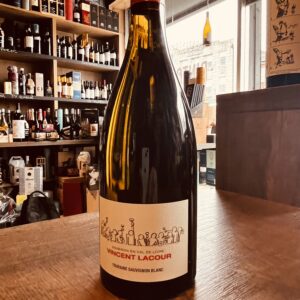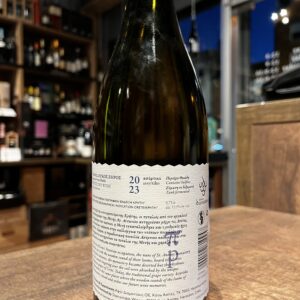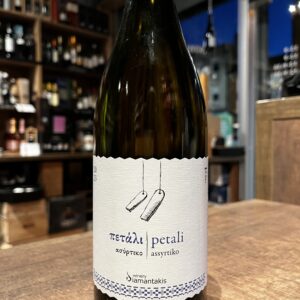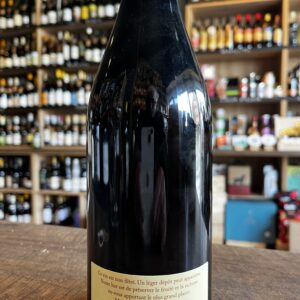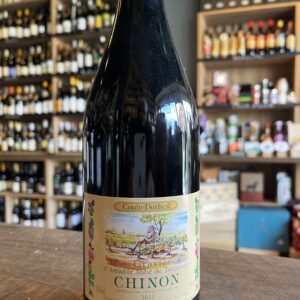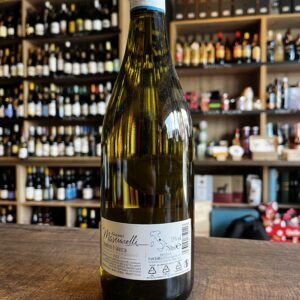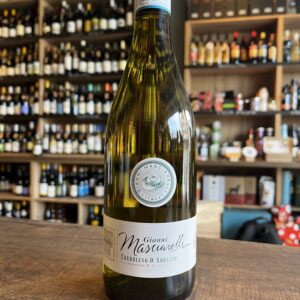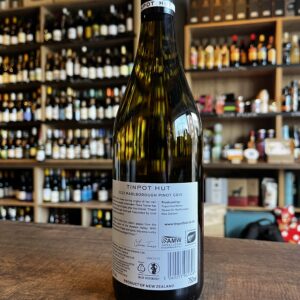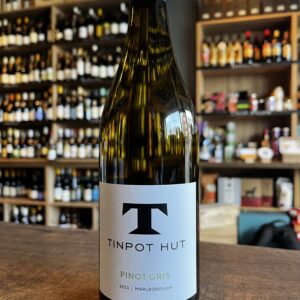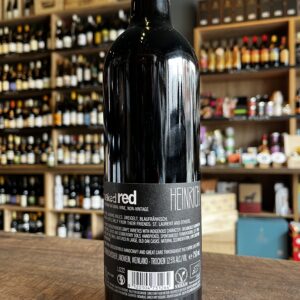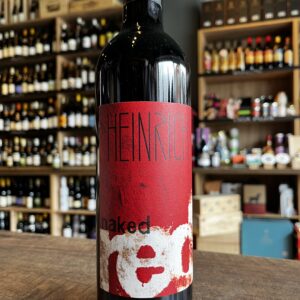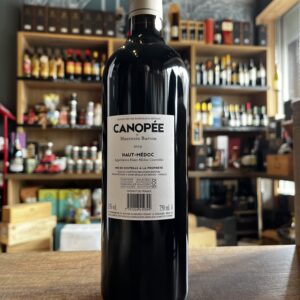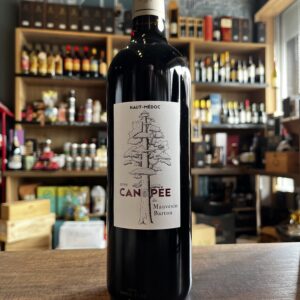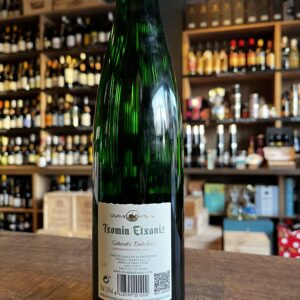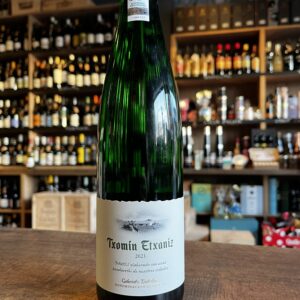-
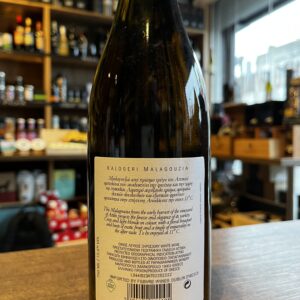
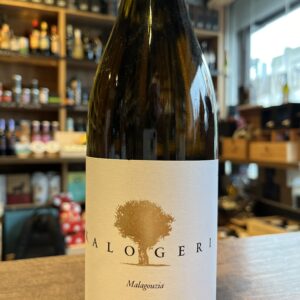 Domaine Papagiannakos was established in 1919 in the heart of the plain of Mesogaia, Attica - just 30km from the shadow of the Acropolis. Third generation winemaker, Vassilis Papagiannakos, was born and bred in Markopoulo, and grew up around the family winery. At that time the Savatiano variety was the winery' s sole focus - but later Malagouzia was introduced, along with Cabernet Sauvignon, Merlot and other varieties. Vassilis owns 10 hectares of vineyard in the Attica region, and maintains long-term leases on a further 20 hectares, with vines on average 50-60 years old. Rocky, sandy, clay topsoil nurtures low yielding bush vines - extremely limited irrigation is employed. The Papagiannakos family continues its traditions whilst bringing the winery into the 21st Century with a stunning and innovative bioclimatic winery. Pair it with Fish Fried, Poultry Casseroles White, Risotto
Domaine Papagiannakos was established in 1919 in the heart of the plain of Mesogaia, Attica - just 30km from the shadow of the Acropolis. Third generation winemaker, Vassilis Papagiannakos, was born and bred in Markopoulo, and grew up around the family winery. At that time the Savatiano variety was the winery' s sole focus - but later Malagouzia was introduced, along with Cabernet Sauvignon, Merlot and other varieties. Vassilis owns 10 hectares of vineyard in the Attica region, and maintains long-term leases on a further 20 hectares, with vines on average 50-60 years old. Rocky, sandy, clay topsoil nurtures low yielding bush vines - extremely limited irrigation is employed. The Papagiannakos family continues its traditions whilst bringing the winery into the 21st Century with a stunning and innovative bioclimatic winery. Pair it with Fish Fried, Poultry Casseroles White, Risotto -
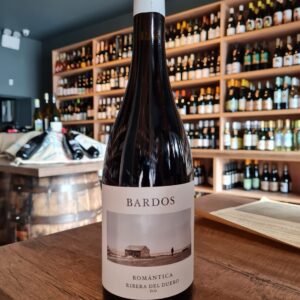 Bardos Romantica is a red wine from Ribera del Duero, produced by Bodegas Bardos, belonging to the Vintae Group, which are known to produce wines in twelve different Spanish regions, such as the Hacienda López from Haro. Made from 100% Tinta del País (Tempranillo). The grapes come from a rigorous selection of low yielding old vines located in the highlands of the central plateau in Onesimus Quintanilla (Valladolid). The grapes, once collected, are transported to the winery in boxes of 15 kilos and small trailers. Here a selection of bunches is made on tables. Subsequent fermentation and maceration is carried out in vats at a temperature of 28ªC for 3 or 4 weeks. Once fermented and macerated, Bardos Romantica undergoes a malolactic fermentation in French oak barrels, with a weekly beating and strict control of each barrel. Finally, Bardos Romantica is aged for 14 months in barrels of one and two years in French oak, located in underground cellars where the temperature is maintained throughout the year at around 14ºC. Bardos Romantica is a soft and original wine. After all the technicalities all I can say is a great wine, enjoy it, share it!
Bardos Romantica is a red wine from Ribera del Duero, produced by Bodegas Bardos, belonging to the Vintae Group, which are known to produce wines in twelve different Spanish regions, such as the Hacienda López from Haro. Made from 100% Tinta del País (Tempranillo). The grapes come from a rigorous selection of low yielding old vines located in the highlands of the central plateau in Onesimus Quintanilla (Valladolid). The grapes, once collected, are transported to the winery in boxes of 15 kilos and small trailers. Here a selection of bunches is made on tables. Subsequent fermentation and maceration is carried out in vats at a temperature of 28ªC for 3 or 4 weeks. Once fermented and macerated, Bardos Romantica undergoes a malolactic fermentation in French oak barrels, with a weekly beating and strict control of each barrel. Finally, Bardos Romantica is aged for 14 months in barrels of one and two years in French oak, located in underground cellars where the temperature is maintained throughout the year at around 14ºC. Bardos Romantica is a soft and original wine. After all the technicalities all I can say is a great wine, enjoy it, share it! -
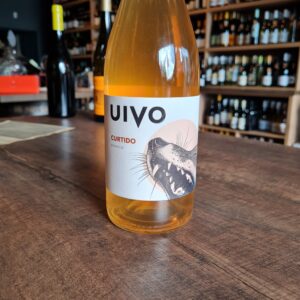 Uivo, a howl back to Nature! Naturally farmed Moscatel Galego, Branco Wine grapes with minimal intervention in the cellar, 4 months of skin contact in cement tanks. Folias de Baco was started in 2007 by young, innovative winemaker, Tiago Sampaio, who was inspired by his grandfather’s vineyard work. He has a vivacious curiosity and loves to experiment at every step of the winemaking/growing processes. He has studied agricultural engineering and has a PhD in Viticulture and Enology from Oregon State University, where he picked up on modern philosophies and aesthetics of winemaking, never forgetting his Douro roots. Folias de Baco is in the Alto Douro, in the sub-region of Cima-Corgo where the land is very tough and challenging at a higher altitude, but it is an expression of traditional melding with modern techniques. The ‘Uivo Curtido’ is comprised of 100% moscatel galego from 35+ year old vines in soils spattered with schist and granite. It is unfined and unfiltered. As tasty as it looks. Organically grown, low-intervention/natural wine, vegan. Have fun with it
Uivo, a howl back to Nature! Naturally farmed Moscatel Galego, Branco Wine grapes with minimal intervention in the cellar, 4 months of skin contact in cement tanks. Folias de Baco was started in 2007 by young, innovative winemaker, Tiago Sampaio, who was inspired by his grandfather’s vineyard work. He has a vivacious curiosity and loves to experiment at every step of the winemaking/growing processes. He has studied agricultural engineering and has a PhD in Viticulture and Enology from Oregon State University, where he picked up on modern philosophies and aesthetics of winemaking, never forgetting his Douro roots. Folias de Baco is in the Alto Douro, in the sub-region of Cima-Corgo where the land is very tough and challenging at a higher altitude, but it is an expression of traditional melding with modern techniques. The ‘Uivo Curtido’ is comprised of 100% moscatel galego from 35+ year old vines in soils spattered with schist and granite. It is unfined and unfiltered. As tasty as it looks. Organically grown, low-intervention/natural wine, vegan. Have fun with it -
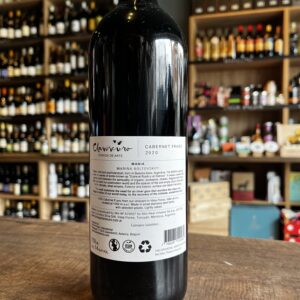
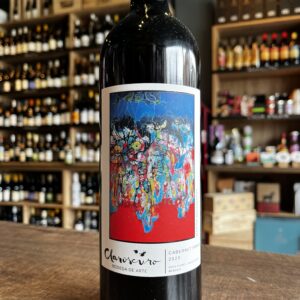 The grapes come from our single vineyard located in Vista Flores, Tunuyán, Uco Valley at 1054 m.a.s.l. (3428 ft). We have a sandy loam soil in the higher levels of the vineyard and stones in the lower parts so we can divide the vineyard into parcels thus generating greater diversity. This allows us to produce a greater variety of wines from the same vineyard. The drip irrigation system in our vineyard sources from the snowmelting of the high peaks
The grapes come from our single vineyard located in Vista Flores, Tunuyán, Uco Valley at 1054 m.a.s.l. (3428 ft). We have a sandy loam soil in the higher levels of the vineyard and stones in the lower parts so we can divide the vineyard into parcels thus generating greater diversity. This allows us to produce a greater variety of wines from the same vineyard. The drip irrigation system in our vineyard sources from the snowmelting of the high peaks -
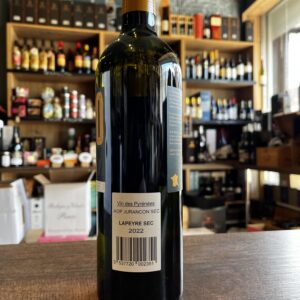
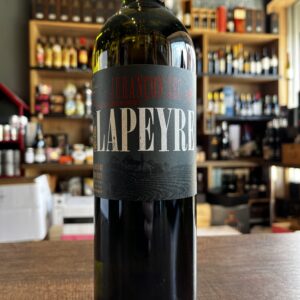 The Clos Lapeyere Estate is a family-owned estate that dealt with rearing livestock, cultivating vines and farming many years ago. It was in 1985 that the head of the family, Jean-Bernard Larrieu decided to exclusively focus on cultivating vines and making classic wines that spoke volumes about the richness of the Chapelle de Rousse appellation.
The Clos Lapeyere Estate is a family-owned estate that dealt with rearing livestock, cultivating vines and farming many years ago. It was in 1985 that the head of the family, Jean-Bernard Larrieu decided to exclusively focus on cultivating vines and making classic wines that spoke volumes about the richness of the Chapelle de Rousse appellation. -
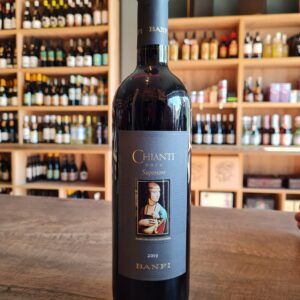 The Banfi Chianti Superiore begins with a very nice aroma of black cherry, plum, a little spice, a little earth and some nice floral notes. Tasting the wine reveals plum, oak,licorice a bit of spice, a nice dense and velvety texture plus dusty tannins = One Terrific Tuscan! Add in good acidity and balance on this medium-bodied wine and you quickly realize this wine is delivering great value for its price. The finish is very nice with good length and features some excellent slightly sour black cherry notes. Try with BBQ-marinated pork ribs, beef and vegetable skewers or T bone steaks. I am a big fan of Tuscan wines specially Banfi, would confidently recommend it.
The Banfi Chianti Superiore begins with a very nice aroma of black cherry, plum, a little spice, a little earth and some nice floral notes. Tasting the wine reveals plum, oak,licorice a bit of spice, a nice dense and velvety texture plus dusty tannins = One Terrific Tuscan! Add in good acidity and balance on this medium-bodied wine and you quickly realize this wine is delivering great value for its price. The finish is very nice with good length and features some excellent slightly sour black cherry notes. Try with BBQ-marinated pork ribs, beef and vegetable skewers or T bone steaks. I am a big fan of Tuscan wines specially Banfi, would confidently recommend it. -
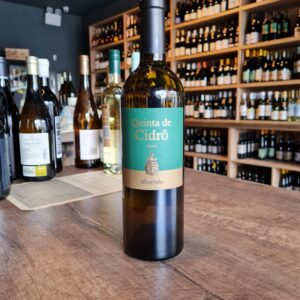 Quinta de Cidrô presents the first Alvarinho produced in the Douro, another superb result of the continuous innovation that takes place in the vineyards of the property. The idea to plant Alvarinho in the Douro came from their ambition to produce a high quality white monovarietal from a Portuguese grape variety. A wine marked by fine and delicate aromas of citrus fruit and orange blossom, which presents an excellent aromatic complexity. Expressive and personalized, it is above all a full-bodied Douro wine, revealing flavours that can be guessed at in the aroma. A long and distinct Alvarinho, determined by a crisp acidity and a tasty minerality.
Quinta de Cidrô presents the first Alvarinho produced in the Douro, another superb result of the continuous innovation that takes place in the vineyards of the property. The idea to plant Alvarinho in the Douro came from their ambition to produce a high quality white monovarietal from a Portuguese grape variety. A wine marked by fine and delicate aromas of citrus fruit and orange blossom, which presents an excellent aromatic complexity. Expressive and personalized, it is above all a full-bodied Douro wine, revealing flavours that can be guessed at in the aroma. A long and distinct Alvarinho, determined by a crisp acidity and a tasty minerality. -
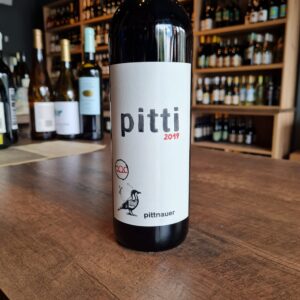 High on the hills of Austria there is more than just a lonely goat herd - there is also a fantastic winery, considered one of the country's best. Pittnauer has a long winemaking tradition in the region, and in 2006 moved to more biodynamic practices. The results are delicious, environmentally friendly wines with years of experience behind them. Now prepare yourself for some varieties you've probably never heard of - Pittnauer's Pitti Red Blend is made from blaufränkisch and Zweigelt grapes with a small quantity of Merlot added to the mixture. These varieties shine brightest in the Austrian climate, where they come together to make a stunningly delicious, full bodied wine reminiscent of spicy Shiraz. The ‘Pitti’ is a blend coming from vines that average 12-15 years in age and are planted on sandy clay mixed with limestone. Dark ruby in colour, the wine has tight tannins with black berries, cherries, cranberries and fresh acidic structure. Whispers of tobacco and liquorice. Ticks all the boxes of quality, drinkability and affordability and yumability.
High on the hills of Austria there is more than just a lonely goat herd - there is also a fantastic winery, considered one of the country's best. Pittnauer has a long winemaking tradition in the region, and in 2006 moved to more biodynamic practices. The results are delicious, environmentally friendly wines with years of experience behind them. Now prepare yourself for some varieties you've probably never heard of - Pittnauer's Pitti Red Blend is made from blaufränkisch and Zweigelt grapes with a small quantity of Merlot added to the mixture. These varieties shine brightest in the Austrian climate, where they come together to make a stunningly delicious, full bodied wine reminiscent of spicy Shiraz. The ‘Pitti’ is a blend coming from vines that average 12-15 years in age and are planted on sandy clay mixed with limestone. Dark ruby in colour, the wine has tight tannins with black berries, cherries, cranberries and fresh acidic structure. Whispers of tobacco and liquorice. Ticks all the boxes of quality, drinkability and affordability and yumability. -
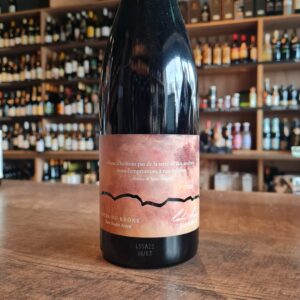 Vincent Rochette comes from a long line of grape growers rather than winemakers. In 1998, he bucked that trend by investing in a cellar and the necessary equipment to allow him to vinify his own grapes, which for five generations had been sold to other winemakers in the area. Vincent is an ardent believer in the benefits of biodynamics, fully converting his estate to follow that philosophy in 2006. He uses only natural products in the vineyard and carries out all his work in keeping with the cosmic cycles of the earth, not only among the vines but also in the cellar. One of his most interesting cuvées is the Côte du Rhone ‘Nature’, which has had no sulphites added at any stage of the winemaking process. Due to the fact that sulphites are naturally present in grapes, there are still 9mg present (below the legal 10mg limit which is required to state that the wine contains sulphites). The result is a wine that is simply a pure expression of Grenache and Syrah. Harvesting, racking and bottling are all carried out in accordance with cosmic rhythms. A delicious wine to consume today, with grills, summer salads, spicy dishes such as couscous, a tagine with candied fruits (apricots, lemons, onions, etc.)
Vincent Rochette comes from a long line of grape growers rather than winemakers. In 1998, he bucked that trend by investing in a cellar and the necessary equipment to allow him to vinify his own grapes, which for five generations had been sold to other winemakers in the area. Vincent is an ardent believer in the benefits of biodynamics, fully converting his estate to follow that philosophy in 2006. He uses only natural products in the vineyard and carries out all his work in keeping with the cosmic cycles of the earth, not only among the vines but also in the cellar. One of his most interesting cuvées is the Côte du Rhone ‘Nature’, which has had no sulphites added at any stage of the winemaking process. Due to the fact that sulphites are naturally present in grapes, there are still 9mg present (below the legal 10mg limit which is required to state that the wine contains sulphites). The result is a wine that is simply a pure expression of Grenache and Syrah. Harvesting, racking and bottling are all carried out in accordance with cosmic rhythms. A delicious wine to consume today, with grills, summer salads, spicy dishes such as couscous, a tagine with candied fruits (apricots, lemons, onions, etc.) -
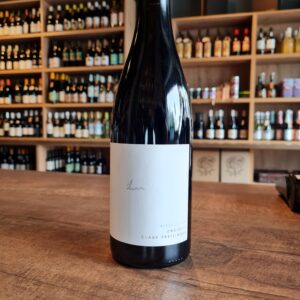 Claus Preisinger has honed his skills around the world, working in vineyards in California, before returning to his Austrian roots to work for Anita and Hans Nittnaus. After branching out on his own, he has kept the respectful and honest winemaking he learned there, and is applying it a stone's throw away in the town of Gols. His "Kieselstein" Zweigelt is one of the most immediately enjoyable wines that I have had the opportunity to drink as of late. This beautifully pure Zweigelt was fermented in neutral barrels with a touch of sulphur added at bottling. Claus Preisinger has been using ambient yeasts since 2002 as well as little to no sulfites. The Preisinger wines are certified biodynamic, which Claus takes very seriously. His commitment to the environment and non-interventional winemaking shines through in the superior wines he produces. Super fresh and juicy. Can be served chilled.
Claus Preisinger has honed his skills around the world, working in vineyards in California, before returning to his Austrian roots to work for Anita and Hans Nittnaus. After branching out on his own, he has kept the respectful and honest winemaking he learned there, and is applying it a stone's throw away in the town of Gols. His "Kieselstein" Zweigelt is one of the most immediately enjoyable wines that I have had the opportunity to drink as of late. This beautifully pure Zweigelt was fermented in neutral barrels with a touch of sulphur added at bottling. Claus Preisinger has been using ambient yeasts since 2002 as well as little to no sulfites. The Preisinger wines are certified biodynamic, which Claus takes very seriously. His commitment to the environment and non-interventional winemaking shines through in the superior wines he produces. Super fresh and juicy. Can be served chilled. -
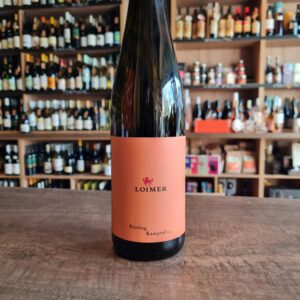 The Loimer estate is located around Langenlois in the sunny Kamptal region of Lower Austria, to the northwest of Vienna. Unlike many Austrian producers who go for a rich, sweet Alsace style, Fred Loimer obtains full ripeness in the vineyard yet ferments to dryness. The resulting wines (like the Loimer Riesling) display his trademark definition, zest and balance on the palate. Fred Loimer realised very early on that his future lay in wine, after his father converted the family farm into a winery. He attended Austria’s renowned Klosterneuburg University and later gained important experience at wineries in Nahe, Germany and in Napa Valley, California. On his return to Langenlois, Fred introduced new methods in the vineyards and winery, with the aim of continually improving the quality of the wine. In 1997, Fred took over the winery from his father and, in 1998, purchased and renovated a historical vaulted brick cellar (a former cellar of the Haindorf Castle) amidst the vines between Langenlois and Zöbing. The wines have been vinified and stored here since 1999. The 60 hectares of vineyards are divided into 100 parcels, planted on seven different soil types (ranging from loess, gravel, clay, sand and slate to Gföhler gneiss, a coarse-grained, metamorphic rock containing quartz, felspar and mica), which bring great complexity to the wines. There is no need to say that the high quality of their soils is crucial for the Loimer Riesling and its minerality. Situated at an altitude of 200-420m above sea level, the south facing vineyards benefit from warm days and cool nights, which encourage the development of the aromatic components in the grapes. The high summer temperatures are mitigated by the River Danube and the Waldviertel (forested area), while the well drained soils mean the vines can form deeply penetrating root systems, thus overcoming even long periods of drought without damage. Since 2006, the vineyard and cellar work has been conducted according to biodynamic principles.
The Loimer estate is located around Langenlois in the sunny Kamptal region of Lower Austria, to the northwest of Vienna. Unlike many Austrian producers who go for a rich, sweet Alsace style, Fred Loimer obtains full ripeness in the vineyard yet ferments to dryness. The resulting wines (like the Loimer Riesling) display his trademark definition, zest and balance on the palate. Fred Loimer realised very early on that his future lay in wine, after his father converted the family farm into a winery. He attended Austria’s renowned Klosterneuburg University and later gained important experience at wineries in Nahe, Germany and in Napa Valley, California. On his return to Langenlois, Fred introduced new methods in the vineyards and winery, with the aim of continually improving the quality of the wine. In 1997, Fred took over the winery from his father and, in 1998, purchased and renovated a historical vaulted brick cellar (a former cellar of the Haindorf Castle) amidst the vines between Langenlois and Zöbing. The wines have been vinified and stored here since 1999. The 60 hectares of vineyards are divided into 100 parcels, planted on seven different soil types (ranging from loess, gravel, clay, sand and slate to Gföhler gneiss, a coarse-grained, metamorphic rock containing quartz, felspar and mica), which bring great complexity to the wines. There is no need to say that the high quality of their soils is crucial for the Loimer Riesling and its minerality. Situated at an altitude of 200-420m above sea level, the south facing vineyards benefit from warm days and cool nights, which encourage the development of the aromatic components in the grapes. The high summer temperatures are mitigated by the River Danube and the Waldviertel (forested area), while the well drained soils mean the vines can form deeply penetrating root systems, thus overcoming even long periods of drought without damage. Since 2006, the vineyard and cellar work has been conducted according to biodynamic principles. -
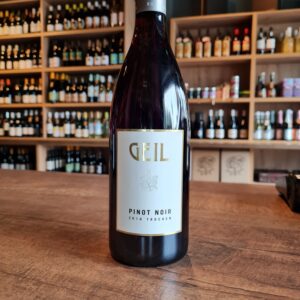 Weingut J. Geil is a winery making approachable, quaffable wines, all along the lines of greatly respecting the nature. This reflects in quality of their fruit and subsequently in their wines. Awarded many trophies each year, Weingut Geil belongs among some of the top German producers. There is nothing to be take lightly about their Pinot Noir, a serious, serious wine. Beautifully earthy and soft, with plenty of ripe wild berries. Excellent balance and considerable length. Accessible and juicy, yet wholeheartedly deep genuinely expressing the terroir of Bechtheim
Weingut J. Geil is a winery making approachable, quaffable wines, all along the lines of greatly respecting the nature. This reflects in quality of their fruit and subsequently in their wines. Awarded many trophies each year, Weingut Geil belongs among some of the top German producers. There is nothing to be take lightly about their Pinot Noir, a serious, serious wine. Beautifully earthy and soft, with plenty of ripe wild berries. Excellent balance and considerable length. Accessible and juicy, yet wholeheartedly deep genuinely expressing the terroir of Bechtheim -
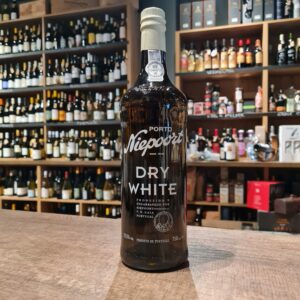 Niepoort is a Portuguese winery that was founded in 1842. It is currently run by Dirk Niepoort, fifth generation of the family it is named after. They use traditional Portuguese techniques such as grape treading, fermentation in cement tanks or aging in pipes, 550-litre port-aging barrels, whilst also using new technologies that ensure the grapes are handled with care. The winery has vines in different locations, some of which are over 100 years old, and an aging cellar in the town of Vila Nova de Gaia. The Niepoort Dry White vines have an average age of 30 years old and are planted in shale soils. The planting density of the plots ranges from 4,000 to 6,000 plants per hectare and the harvest is carried out manually to take the best care of the grapes. Serve as an aperitif, but it also goes down a treat as a dessert wine or simply on its own at the end of a meal
Niepoort is a Portuguese winery that was founded in 1842. It is currently run by Dirk Niepoort, fifth generation of the family it is named after. They use traditional Portuguese techniques such as grape treading, fermentation in cement tanks or aging in pipes, 550-litre port-aging barrels, whilst also using new technologies that ensure the grapes are handled with care. The winery has vines in different locations, some of which are over 100 years old, and an aging cellar in the town of Vila Nova de Gaia. The Niepoort Dry White vines have an average age of 30 years old and are planted in shale soils. The planting density of the plots ranges from 4,000 to 6,000 plants per hectare and the harvest is carried out manually to take the best care of the grapes. Serve as an aperitif, but it also goes down a treat as a dessert wine or simply on its own at the end of a meal -
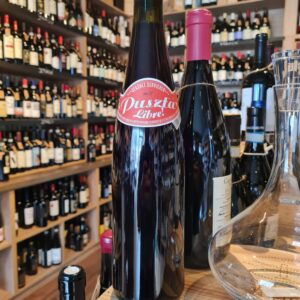 Claus Preisinger made his first wine when he was just 20 years old and quickly expanded the 3 hectares of his family vineyards by the Neusiedlersee lake in Burgenland (Austria) to 19 ha. He is the youngest member of Pannobile, a group created to champion the unique character of Burgenland’s terroir and local varieties, and a promising new Austrian producer. Puszta Libre! comes from vineyards lying on the north shore of Lake Neusiedl on very varied sandy loam soils, with flint, quartz, slate and limestone. Basing his work Rudolf Steiner's biodynamic principles, he maintains the natural balance of the vineyard using only organic and biodynamic practices. Puszta Libre! is a tribute to ancient viticulture both in the way it is made and in the way it is presented. Its design is inspired by classic soft drinks and invites you to drink it cold and without preconceived ideas. Drink slighly chilled and with your mates!
Claus Preisinger made his first wine when he was just 20 years old and quickly expanded the 3 hectares of his family vineyards by the Neusiedlersee lake in Burgenland (Austria) to 19 ha. He is the youngest member of Pannobile, a group created to champion the unique character of Burgenland’s terroir and local varieties, and a promising new Austrian producer. Puszta Libre! comes from vineyards lying on the north shore of Lake Neusiedl on very varied sandy loam soils, with flint, quartz, slate and limestone. Basing his work Rudolf Steiner's biodynamic principles, he maintains the natural balance of the vineyard using only organic and biodynamic practices. Puszta Libre! is a tribute to ancient viticulture both in the way it is made and in the way it is presented. Its design is inspired by classic soft drinks and invites you to drink it cold and without preconceived ideas. Drink slighly chilled and with your mates! -
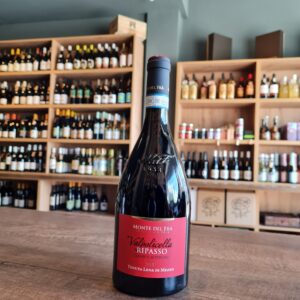 The Monte del Fra Valpolicella Classico appears deep ruby red with ripe red fruit accompanied with spice and earthiness on the nose. The palate displays delicious cherry and plum fruit, locked with sweet liquorice and warm cinnamon, finishing full, with velvety soft tannins and spice. Excellent wine that will get better and better, allow to breathe, even decant and would be best served with roasts, stews, braised meats and strong cheese.
The Monte del Fra Valpolicella Classico appears deep ruby red with ripe red fruit accompanied with spice and earthiness on the nose. The palate displays delicious cherry and plum fruit, locked with sweet liquorice and warm cinnamon, finishing full, with velvety soft tannins and spice. Excellent wine that will get better and better, allow to breathe, even decant and would be best served with roasts, stews, braised meats and strong cheese. -
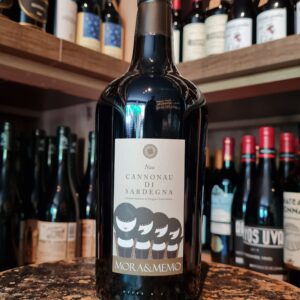 In a region dominated by cooperatives, Mora e Memo stand out for many reasons. This beautiful estate sits high in the hills in the South East of Sardinia just a few kilometres from the sea. Focused on the indigenous Sardinian varieties of Cannonau and Vermentino the combination of mature vineyards, sensitive farming and a delicate touch in their modern and technologically well equipped cellar results in elegant, vibrant mineral wines- very different from the rustic Sardinian norm. Pair it with Salami Antipasti, pasta dishes with tasty sauces, red meats, mature cheeses.
In a region dominated by cooperatives, Mora e Memo stand out for many reasons. This beautiful estate sits high in the hills in the South East of Sardinia just a few kilometres from the sea. Focused on the indigenous Sardinian varieties of Cannonau and Vermentino the combination of mature vineyards, sensitive farming and a delicate touch in their modern and technologically well equipped cellar results in elegant, vibrant mineral wines- very different from the rustic Sardinian norm. Pair it with Salami Antipasti, pasta dishes with tasty sauces, red meats, mature cheeses.


